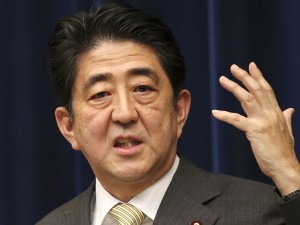Japan looks for Asean backing on China at summit

In this Monday, Dec. 9, 2013, file photo, Japanese Prime Minister Shinzo Abe speaks during a press conference in Tokyo. Japan will play host to Southeast Asian leaders this weekend as it looks to strengthen friendships in a region increasingly dominated by China and as it squares off with Beijing over disputed islands. AP PHOTO/KOJI SASAHARA
TOKYO—Japan will play host to Southeast Asian leaders this weekend as it looks to strengthen friendships in a region increasingly dominated by China and as it squares off with Beijing over disputed islands.
Japanese Prime Minister Shinzo Abe will be looking for support from among the 10 members of the Association of South East Asian Nations (Asean), hoping countries that have their own territorial disputes with China will be prepared to line up alongside Japan.
“It’s important that Japan and Asean jointly express some kind of political message on freedom of overflight and navigation on high seas,” said Ichiro Fujisaki, a professor at Sophia University in Tokyo and a former Japanese ambassador to the United States.
“If Japanese and Asean leaders fail to touch on the issue… it will encourage expansionist factions inside China to take more aggressive actions,” he said.
The special summit is being held to mark the 40th anniversary of relations between Japan and Asean, but it comes at a time when Japan is reengaging with the region after several years in which it has been muscled out by China’s growing economic might.
Article continues after this advertisementIt also comes weeks after China’s declaration of an air defense identification zone over a tranche of the East China Sea, including islands disputed with Japan, a move that ratcheted up an already tense dispute.
Article continues after this advertisementBeijing said planes entering the zone must obey its orders and provide a flight plan to Chinese authorities, or face unspecified “defensive emergency measures.”
Tokyo, Seoul and Washington all said they would ignore the zone and sent military or paramilitary planes through it in defiance. The issue dominated a tour of northeast Asia last week by US Vice President Joe Biden.
Southeast Asia zone
Some observers have said the air defense zone over the East China Sea was a precursor to Beijing’s plans for a similar zone over the West Philippine Sea (South China Sea), which it claims almost in its entirety.
The Philippines, Vietnam, Malaysia and Brunei—all Asean members—have competing claims to parts of the sea, and Manila and Hanoi have in recent years repeatedly accused China of becoming more aggressive.
Analysts say China’s strategy with Asean has been to split off countries and negotiate with them individually.
The United States and its allies would like Asean to present a united front.
“Supporting the framework of Asean—whose members take slightly different positions in relations with China and have different political systems—is also important for Japan,” Fujisaki said.
The summit will issue a joint statement on the long-term “vision” on Japan-Asean cooperation in areas of security and economy, Jiji Press and other news organizations have reported.
A draft of the document says Japan and Asean believe abuse of power in international civil aviation can pose a security “threat,” Kyodo News reported, citing an unidentified diplomatic source. The document reportedly does not single out China.
Asean support
Haruka Matsumoto, researcher at the Japanese government-backed Institute of Developing Economies, said Tokyo could reasonably expect to get a measure of support from the meeting.
“Because the issue of freedom of navigation is a very sensitive issue for Asean countries, they are expected to side with Japan on the issue,” he said.
Abe has visited all 10 Asean member states—Brunei, Cambodia, Indonesia, Laos, Malaysia, Burma (Myanmar), the Philippines, Singapore, Thailand and Vietnam—since taking power last December.
He is keen to tap the infrastructure needs of the fast-
developing region as part of his drive to boost exports but Japanese policy makers are also keenly aware of the benefit of building metaphorical bridges.
That includes talks over expanding currency swap arrangements where Japan will help countries to cushion their economies in financial emergencies, a Japanese official said this month.
Japan’s high-profile response to the recent supertyphoon that raked the Philippines, in which it offered $53 million and deployed more than 1,000 troops, was seen as a demonstration of its friendship after a disaster that left nearly 6,000 dead and thousands missing.
That contrasted with China’s response, in which it announced initially it was sending only $100,000 in humanitarian relief. The figure was later increased by $1.6 million but not before a round of stinging criticism, including from Internet users in China.
Bilateral summits
The leaders of nine Asean nations will hold bilateral summits with Abe on the day either side of the Saturday summit.
Thailand’s Yingluck Shinawatra is the only confirmed no-show, having opted to stay in Bangkok where mass rallies have forced her to call a snap election, with protesters demanding that she step down.